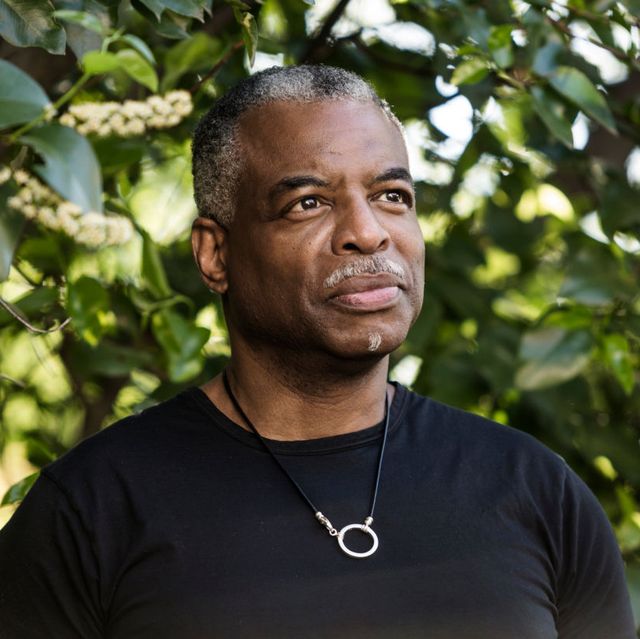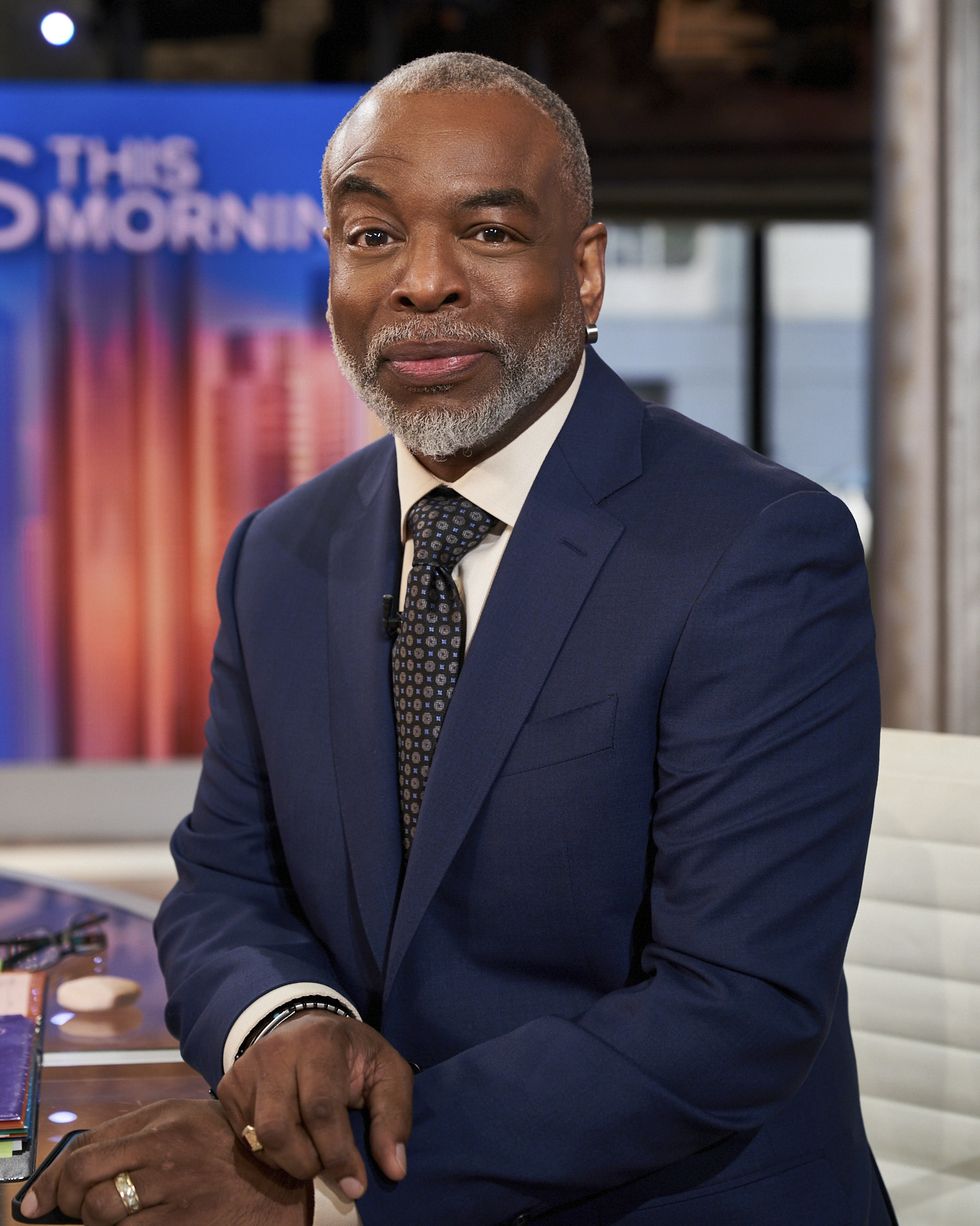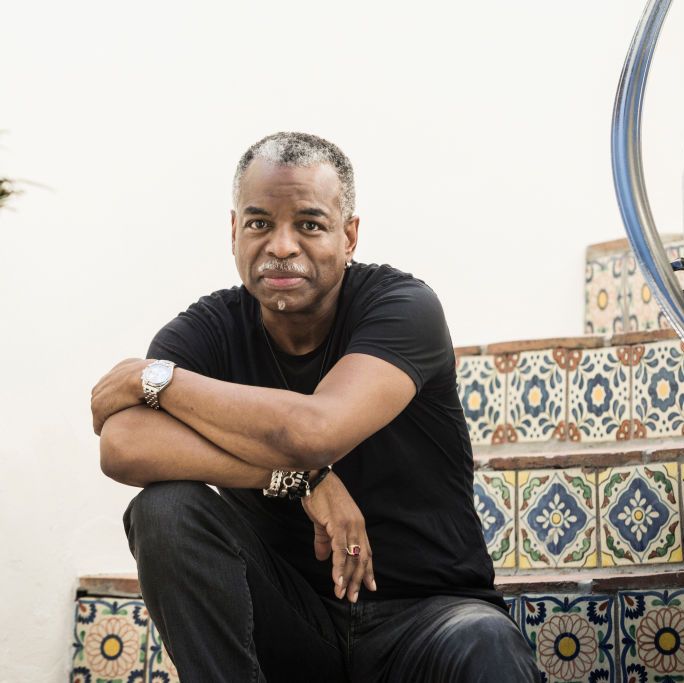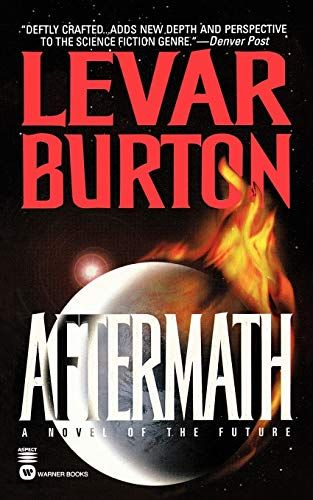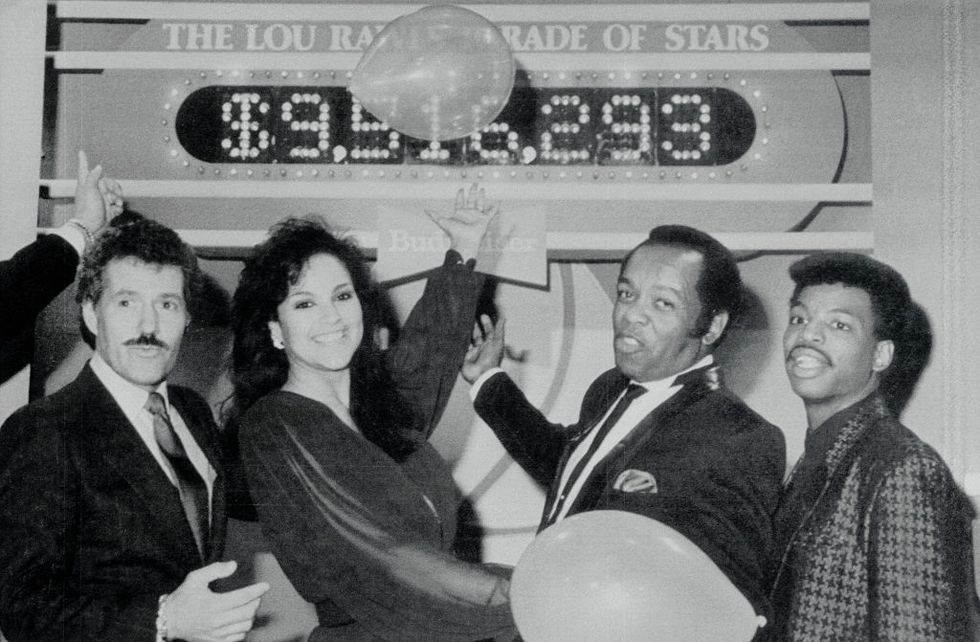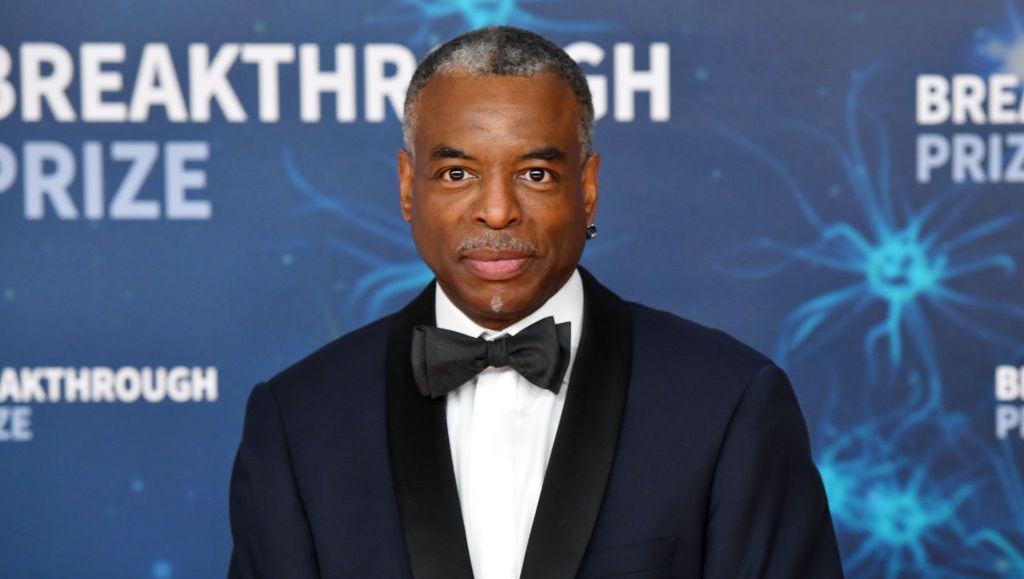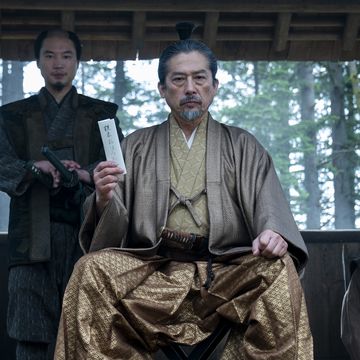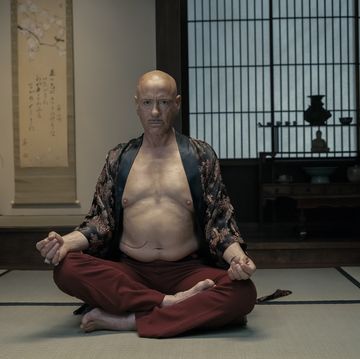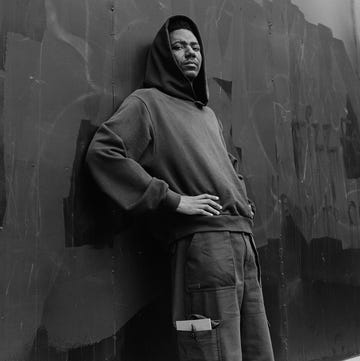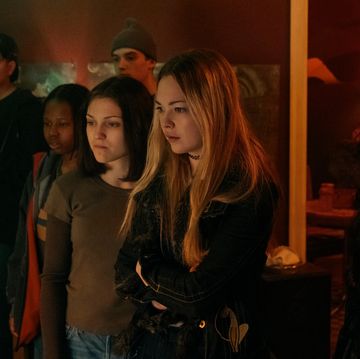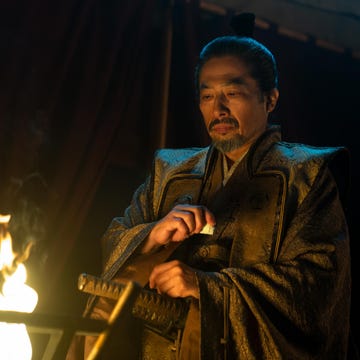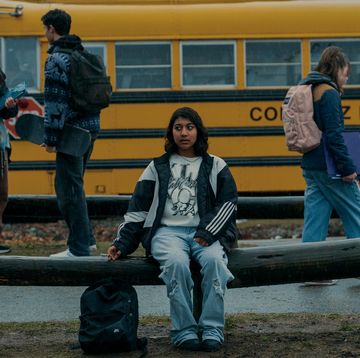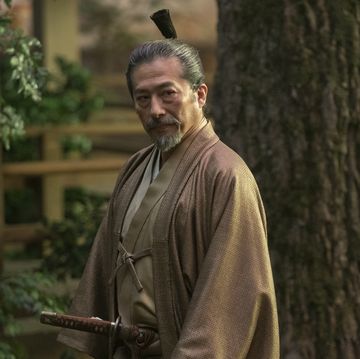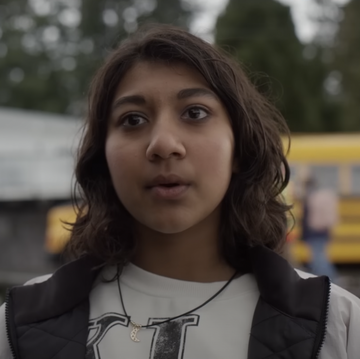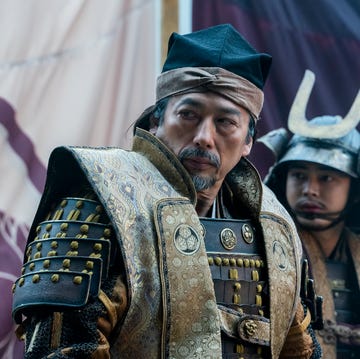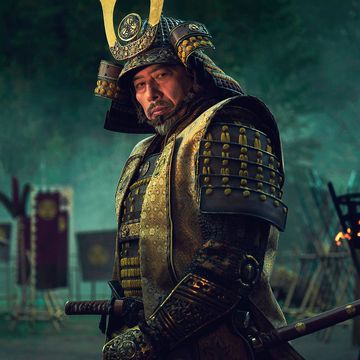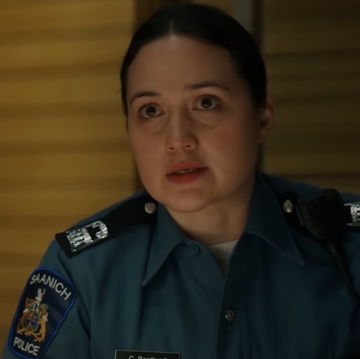LeVar Burton's turn behind the Jeopardy! podium has been a long time coming. In 2013, Burton tweeted that his dream job would be to host Jeopardy!; in September 2020, he tweeted, “Not gonna lie, I feel like I’ve been preparing my whole life to occupy the Jeopardy! podium when Alex Trebek retires.” Then, the world turned upside down for devoted Jeopardy! viewers like Burton—in November 2020, Trebek died of pancreatic cancer, leaving a void in American life that seemingly no one could fill. But the show must go on, so Jeopardy! producers hired a revolving door of prominent broadcasters, athletes, and actors to moderate America's favorite game show. "The guest hosts were a way to find a permanent replacement for Alex," Burton told Esquire, "but also an appropriate way for America to get used to the fact that Alex wasn't going to be there anymore."
Now, Burton is stepping up to the plate as a Jeopardy! Season 37 guest host, while an announcement about the permanent host looms. Burton, the public intellectual who cultivated a love of reading and knowledge in an entire generation of Americans through the Peabody Award-winning series Reading Rainbow, seems an obvious successor to Trebek. But if he doesn't get the gig, don't worry about him. "If I don't get it, I'll be fine," Burton told Esquire. "My life will go on."
It's been a busy year for Burton, who has partnered with MasterClass to teach "The Power of Storytelling," a digital course breaking down his approach to communication, imagination, and the shared language of humanity. The course is characteristic Burton: brimming with wit, wisdom, and empathy, Burton instructs MasterClass members in everything from public speaking to the value of storytelling as it relates to representation. Meanwhile, Burton's popular podcast about short fiction, LeVar Burton Reads, has entered its ninth season. When he wasn't highlighting works of fiction by other writers, Burton was revisiting his own fiction: Aftermath, his 1997 speculative fiction novel, re-released this summer as an audiobook. Set in 2019, Aftermath is an eerily prescient dystopian story about a United States recovering from civil war, famine, and disease, all of it resulting from the assassination of the first Black president-elect by a white supremacist. Evidently Burton is a busy man, but less than a week before his Jeopardy! episodes were set to air, he made time to speak with Esquire about his enduring love of storytelling, his commitment to honoring Alex Trebek's legacy, and his conviction that he's the right host for the permanent job at Jeopardy!.
Esquire: In September 2020, you tweeted that you feel like you’ve spent your whole life preparing to stand behind the Jeopardy! podium. Why do you feel that way?
LeVar Burton: I've watched the show with my family all of my life. I feel like America has a relationship with this show. We all feel that it's very personal, our relationship with the show or our relationship with Alex. I think we all have a vested stake in what happens with the show next because we're all invested. We watch every night.
Everything that I’m about is in the same vein as Jeopardy!. The idea of education being a value or a principle, and that education should be available to everyone. We take that nightly quiz and test ourselves against those champions, and we play the game as a nation every night. The things that I’ve done in terms of using the medium of television to do more than simply entertain—bringing a little more to the table to educate, inform, enlighten, uplift… Jeopardy! does those things too. Jeopardy! is definitely a bright spot in the nation's consciousness.
ESQ: In the more immediate sense, once you confirmed that you would be hosting Jeopardy!, how did you prepare in the months and the weeks leading up to taping your episodes?
LB: There wasn't a lot of time to actually physically prepare. I had one day of rehearsal, and then the following day, I shot five episodes of the show. I'm pretty sure that was the same for all the guest hosts. Those who hosted for two weeks might've gotten an additional rehearsal day. We rehearsed for a few hours one day and the next day I was in the hot seat. It was a very intense couple of days.
ESQ: What about it surprised you, or was different from what you expected?
LB: I've done a lot of things to test myself, like jumping out of an airplane and walking on hot coals with Tony Robbins. This was still the scariest thing I’ve ever done.
ESQ: Scarier than jumping out of an airplane?
LB: Absolutely. Oddly enough, when you’re jumping out of an airplane, you're either going to be successful at it or you're not. You're going to have a safe landing or you’re not. With Jeopardy!, the pressure is, “Am I doing everything that I need to be doing?” There's such an expectation, or at least an expectation that I put on myself, to do Alex's memory proud—to bring the same standard for excellence that I apply in every other aspect of my life to these five shows. I think at the end of the day, what I needed to do was just be myself. I had to just relax and not concern myself so much with the mechanics, because Alex had decades to perfect the way he made it look so effortless. The one thing I hope I was able to do was just be myself.
ESQ: What was your relationship with Alex like?
LB: We met a few times. Every time I ran into Alex, I would say to him, "Celebrity Jeopardy!, Alex! Let’s do a Celebrity Jeopardy!" For years, he told me, "Well, we never want to compromise the questions for the show. We don't want to make a separate set of standards for celebrities.” I was so ecstatic when I heard they were doing Celebrity Jeopardy!. I couldn't wait to get on and compete. I’m very proud to say that I won. Charles de Gaulle—that was the Final Jeopardy response. I got it correct. I’ve never forgotten that.
It felt like that again when Alex passed and I saw that they’d put in place this process. As [Jeopardy! executive producer] Mike Richards explained it to me, America needed to mourn Alex's passing. The guest hosts were a way to find a permanent replacement for Alex, but also an appropriate way for America to get used to the fact that Alex wasn't going to be there anymore. I think this was really incredibly wise of the Jeopardy! producers, to build in this interim period. It's a healthy way to mourn and move forward. That’s another reason I'm really happy to be a part of this—because I didn't think about that at the beginning. I thought, “Now they’re going to have to find a permanent host.” Then Mike shared with me why they were going through this process, which made perfect sense. We have to mourn.
ESQ: That’s such a beautiful sentiment. What’s so special about Alex Trebek’s legacy is that he’s been in our living rooms every night for decades. We feel like we know him, and he means so much to us, but of course viewers know the TV Alex. You knew the real Alex. What was the real Alex like?
LB: My encounters with Alex led me to believe that he was every bit the guy we saw on TV. You see, the real secret to inspiring that loyalty in fans is by allowing yourself to be vulnerable with them. Alex had that ability to be himself. He had a multifaceted personality. You just assumed that Alex knew the answers to all of those questions. When he was a little bit assertive or snarky, you loved it because he was good at it. You also felt the depth of caring and the wealth of respect he held for the game and the contestants. You just knew that Alex was the right person for the job, because he had that combination of everything a person needs to be in a job like that and survive for decades, coming into people’s living rooms every evening.
The reason he was so embraced and beloved is because he earned it, just like Fred Rogers. When I went to meet Fred Rogers for the first time, I was excited, because I was really interested in knowing what the real man was like. I assumed that the persona on Mr. Rogers' Neighborhood was a character he had created. I couldn't have been more wrong. Fred was the most authentic human being I've ever met. Who he was on TV was exactly who he was in real life: he was that present, that caring, that compassionate, and that empathetic. The same is true for Alex. We feel like we got to know who he was, because we did. We could sense the quality of his character through what he shared and how he did that job every day for decades.
ESQ: Something I’ve enjoyed while watching the guest hosts is the fact that nobody is trying to do an Alex Trebek pantomime. It's been so fun to see each host’s unique spin on how to host the show and run the game. What’s unique about your approach to Jeopardy!?
LB: I don't know. I have no idea. I hope that I was able to communicate my deep level of love for the game, for the show, and for Alex—and to further demonstrate my love of knowledge, learning, education, and information. We live in a world where facts are, for some reason, subject to interpretation, these days. Jeopardy! is the one place in American life where we agree every night that the responses to those answers are the truth. There's no debate. There's no politicization of the facts on Jeopardy!. We can all agree that in this space, for this one half an hour, everyone in America can spend that time with their family, and enjoy and be enriched at the same time. I'd pay for that privilege every night if I had to.
ESQ: You said in the New York Times, “For a Black man to occupy that podium is significant.” Can you elaborate on that?
LB: It’s significant in the same sense that Barack Obama was elected president of the United States in 2008. Jeopardy! occupies a singular place in American culture. To have a person of color or a marginalized person standing behind that podium is good for America. It means something. It’s a milestone marker on this journey toward wholeness that the great American experiment is supposed to be about.
ESQ: When the news broke that you'd be hosting Jeopardy!, did you get feedback from Black viewers that this was important or meaningful to them?
LB: I got feedback from all corners about how excited they were for me, and how meaningful they knew this was to me and to them.
ESQ: You didn't just get feedback. You got a petition!
LB: Well, yeah! Yeah, I did.
ESQ: How does that feel, to be the subject of this huge petition, and to have so many people wanting you on this stage permanently?
LB: It felt very much like the Kickstarter did, years ago, when we brought to the market what became the Reading Rainbow app, and then Skybrary after that. What that Kickstarter said to me was the same thing the petition said: “We invested in you, LeVar, because you have made an investment in us.” That feels really, really good.
ESQ: You’re teaching a MasterClass called, “The Power of Storytelling.” What exactly will that curriculum entail?
LB: I have to laugh, because at first, I thought, "Boy, is there a whole curriculum in here? Can what I do actually be broken down and codified?" I have to hand it to the MasterClass team. They really know what they're doing. In a series of conversations, they pulled the curriculum from me. Everything that I talk about in that class are pieces of me—pieces not only of my process, but the thinking and the feeling behind why I do what it is I do. Even the way I do it. I think it’s just extraordinary that the team at MasterClass are able to mine that information from all of these different people from different backgrounds who have something to say about their area of expertise. I'm blown away, genuinely blown away, at the outcome of the course itself and the way it's presented. From the production design to their quality of the energy on the set, they created a stage space in two days. They make a conscious effort to create an environment where the instructor can deliver their best self, and boy, did they ever get that right.
ESQ: How are our lives improved when we become better storytellers?
LB: I think it has personal relevance to everyone because we all have a story, whether we’re aware of it or not. We’re constantly sharing our story with people—strangers and people we know alike. We’re constantly communicating, telegraphing, and sharing our stories with the people we meet and encounter in life. To be aware of your story and know how to more effectively communicate your story—I think that’s of value to all of us.
ESQ: Your podcast, LeVar Burton Reads, is now in season nine. What's your selection process like for the podcast? What makes a great short story, in your book?
LB: A mark of a great story is one where, when I read it, I begin to become excited about the prospect of reading it aloud. When those elements come together in a story, and there's a voice that I find particularly attractive, or the point of view, or a character, or a writing style, or subject matter—that gets me excited about wanting to share with an audience. That's the litmus test for me. Wanting to read aloud is what I get excited about. It's a great, great joy for me to read aloud. It's one of my favorite ways of being a storyteller—taking the words of a writer and interpreting them. That's what it is for me. It's a one-time performance piece. With the podcast, we're capturing that amber in resin, crystallized, for people to listen to on their own time, in their own way. That’s like magic for me.
ESQ: It’s also a means of communion that you just don't get when you read in your head to yourself. How you read it to me is different from how I read to myself.
LB: Exactly. Because when we read, we make the movie in our heads. That’s my process too, only I'm trying to get what's in my head out of my mouth. I love the process because the writer leaves delicious clues in the text. Finding those clues and linking them together is so much fun for me.
ESQ: You spend so much time with other people's fiction, but it’s wonderful to see that you've revisited your novel, Aftermath, as a new audiobook two decades after publication. What was it like revisiting this novel all these years later, post-Trump and post-insurrection, when so much of the novel's events and the very timeline of the novel seems so prescient?
LB: Crazy. Absolutely crazy. I'm a huge fan of Octavia Butler; if you read her Parable of the Sower series, she does an unbelievably uncanny job of predicting right where we find ourselves in this moment in America. From time to time, I would have occasion to go back to Aftermath and look at the chronology of events at the beginning of the book. I’d just be amazed. When I wrote the character of Lawrence Everett, the senator from Kansas who becomes the first African American president of the United States. I myself didn’t believe this could be anything other than fiction. I didn’t believe that I would ever see a Black man be elected President of the United States in my lifetime. I assumed that it would happen, but not in the span of my own lifetime. That was the biggest whoa for moment for me. On the flip side, there was also the retrenchment of racial animosity in America, simply because we refuse to be honest about our story.
ESQ: Are you still writing fiction? Do you have another novel in you?
LB: I think the next writing that I focus on will probably be a memoir. It's going to take a minute. I'm being encouraged to write a memoir, and I think it's probably a good idea. There are so many stories I want to tell from the past 45 years—moments that have really shaped my life and have enriched my ability to help shape the lives of others through my work.
ESQ: With your Jeopardy! episodes set to air next week, how are you feeling?
LB: My goal was get a shot. To be able to compete. I really feel like, had I not done everything I could to get in the door, I would have regretted it. Someone shared with me earlier, “Regret is the cancer of life.” I've learned enough to know what a bitter pill regret is. That’s why I was so vocal in saying that I wanted the job. I wanted the opportunity to compete. Having said that, I feel like I'm right for this job. If I don't get it, I'll be fine. My life will go on. I am enormously happy and content with who I am and what I do and how I do it. I don't expect that to change whether I get the Jeopardy! job or not. For now, I'm excited to see the episodes. I'm really eager to see how I did.
ESQ: You haven't seen them?
LB: No, I haven't! This has been a very, very anxiety-producing process. At the beginning of the summer, I thought I'd never get here. I’m less than a week away from having my first episode air. That felt so far in the distance when this all began, but we're finally here, and it’s great to be here.
